 Go to A-Z Databases: Books & eBooks to search for more eBooks. Must be on campus or login with your COM account for off campus access.
Go to A-Z Databases: Books & eBooks to search for more eBooks. Must be on campus or login with your COM account for off campus access.
Want more on finding books or eBooks? Try our How to Use Books & eBooks guides.
-
 50 Biology Ideas You Really Need to Know
From mass extinction to immunity, and from sociobiology to swarm behaviour, 50 Biology Ideas You Really Need to Know will open you eyes to the fundamental biological processes that are essential to all life on earth, beginning with innovations unique to animals - such as the development of muscles and importance of circulation - and moving through to genetics, cells, tissues and, finally, the nature of groups of organisms.
50 Biology Ideas You Really Need to Know
From mass extinction to immunity, and from sociobiology to swarm behaviour, 50 Biology Ideas You Really Need to Know will open you eyes to the fundamental biological processes that are essential to all life on earth, beginning with innovations unique to animals - such as the development of muscles and importance of circulation - and moving through to genetics, cells, tissues and, finally, the nature of groups of organisms.
-
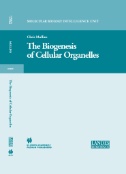 The Biogenesis of Cellular Organelles
The Biogenesis of Cellular Organelles represents a comprehensive summary of recent advances in the study of the biogenesis and functional dynamics of the major organelles operating in the eukaryotic cell. This book begins by placing the study of organelle biogenesis in a historical perspective by describing past scientific strategies, theories, and findings and relating these foundations to current investigations.
The Biogenesis of Cellular Organelles
The Biogenesis of Cellular Organelles represents a comprehensive summary of recent advances in the study of the biogenesis and functional dynamics of the major organelles operating in the eukaryotic cell. This book begins by placing the study of organelle biogenesis in a historical perspective by describing past scientific strategies, theories, and findings and relating these foundations to current investigations.
-
 The Biological Universe: Life in the Milky Way and Beyond
Are we alone in the universe, or are there other life forms 'out there'? This is one of the most scientifically and philosophically important questions that humanity can ask. Now, in the early 2020s, we are tantalizingly close to an answer. As this book shows, the answer will almost certainly be that life forms are to be found across the Milky Way and beyond. They will be thinly spread, to be sure. Yet the number of inhabited planets probably runs into the trillions. Some are close enough for us to detect evidence of life by analysing their atmospheres. This evidence may be found within a couple of decades. Its arrival will be momentous. But even before it arrives we can anticipate what life elsewhere will be like by examining the ecology and evolution of life on Earth. This book considers the current state of play in relation to these titanic issues.
The Biological Universe: Life in the Milky Way and Beyond
Are we alone in the universe, or are there other life forms 'out there'? This is one of the most scientifically and philosophically important questions that humanity can ask. Now, in the early 2020s, we are tantalizingly close to an answer. As this book shows, the answer will almost certainly be that life forms are to be found across the Milky Way and beyond. They will be thinly spread, to be sure. Yet the number of inhabited planets probably runs into the trillions. Some are close enough for us to detect evidence of life by analysing their atmospheres. This evidence may be found within a couple of decades. Its arrival will be momentous. But even before it arrives we can anticipate what life elsewhere will be like by examining the ecology and evolution of life on Earth. This book considers the current state of play in relation to these titanic issues.
-
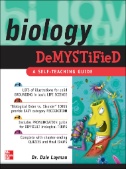 Biology Demystified
Say goodbye to dry presentations, grueling formulas, and abstract theory that would put Einstein to sleep--now there's an easier way to master chemistry, biology, trigonometry, and geometry. McGraw-Hill's Demystified Series teaches complex subjects in a unique, easy-to-absorb manner and is designed for users without formal training, unlimited time, or genius IQs
Biology Demystified
Say goodbye to dry presentations, grueling formulas, and abstract theory that would put Einstein to sleep--now there's an easier way to master chemistry, biology, trigonometry, and geometry. McGraw-Hill's Demystified Series teaches complex subjects in a unique, easy-to-absorb manner and is designed for users without formal training, unlimited time, or genius IQs
-
 Cambridge Dictionary of Human Biology and Evolution
Packed with descriptions of terms, specimens, sites and names, covers a broad range of subjects within human biology, physical anthropology, anatomy, auxology, primatology, physiology, genetics, paleontology, and zoology.
Cambridge Dictionary of Human Biology and Evolution
Packed with descriptions of terms, specimens, sites and names, covers a broad range of subjects within human biology, physical anthropology, anatomy, auxology, primatology, physiology, genetics, paleontology, and zoology.
-
 The Development of Animal Form : Ontogeny, Morphology, and Evolution
Contemporary research in the field of evolutionary developmental biology, or 'evo-devo', has to date been predominantly devoted to interpreting basic features of animal architecture in molecular genetics terms. Considerably less time has been spent on the exploitation of the wealth of facts and concepts available from traditional disciplines, such as comparative morphology, even though these traditional approaches can continue to offer a fresh insight into evolutionary developmental questions.
The Development of Animal Form : Ontogeny, Morphology, and Evolution
Contemporary research in the field of evolutionary developmental biology, or 'evo-devo', has to date been predominantly devoted to interpreting basic features of animal architecture in molecular genetics terms. Considerably less time has been spent on the exploitation of the wealth of facts and concepts available from traditional disciplines, such as comparative morphology, even though these traditional approaches can continue to offer a fresh insight into evolutionary developmental questions.
-
 A Dictionary of Biology
This major revision of A Dictionary of Biology, including over 1,500 new entries, is the most up-to-date biology dictionary available. Including 4,000 clear and concise entries, it covers all the commonly encountered terms and concepts in biology, biophysics, and biochemistry, as well as terms from medicine and palaeontology taking into account the recent advances in these fields. Conforming to the recommendations of the Institute of Biology, both in its definition of terms and system of classification, this superb dictionary offers authoritative coverage of current areas of study such as molecular biology, genetics (including genetic engineering), and biotechnology, and new areas such as food technology, geomicrobiology, and glycobiology. It is the perfect reference source for anyone interested in this dynamic field.
A Dictionary of Biology
This major revision of A Dictionary of Biology, including over 1,500 new entries, is the most up-to-date biology dictionary available. Including 4,000 clear and concise entries, it covers all the commonly encountered terms and concepts in biology, biophysics, and biochemistry, as well as terms from medicine and palaeontology taking into account the recent advances in these fields. Conforming to the recommendations of the Institute of Biology, both in its definition of terms and system of classification, this superb dictionary offers authoritative coverage of current areas of study such as molecular biology, genetics (including genetic engineering), and biotechnology, and new areas such as food technology, geomicrobiology, and glycobiology. It is the perfect reference source for anyone interested in this dynamic field.
-
 Dictionary of Developmental Biology and Embryology
The Dictionary of Developmental Biology and Embryology, Second Edition is the first comprehensive reference focused on the field's terms, research, history, and people. This authoritative A-to-Z resource covers classical morphological and cytological terms along with those from modern genetics and molecular biology.
Dictionary of Developmental Biology and Embryology
The Dictionary of Developmental Biology and Embryology, Second Edition is the first comprehensive reference focused on the field's terms, research, history, and people. This authoritative A-to-Z resource covers classical morphological and cytological terms along with those from modern genetics and molecular biology.
-
 Encyclopedia of the Human Genome
Presenting a comprehensive and rigorously detailed overview of current research and its groundbreaking applications, this major reference work examines many peripheral topics surrounding the field such as law, ethics, medicine and public health, history, religion and industry.
Encyclopedia of the Human Genome
Presenting a comprehensive and rigorously detailed overview of current research and its groundbreaking applications, this major reference work examines many peripheral topics surrounding the field such as law, ethics, medicine and public health, history, religion and industry.
-
 First Signals : The Evolution of Multicellular Development
The enormous recent success of molecular developmental biology has yielded a vast amount of new information on the details of development. So much so that we risk losing sight of the underlying principles that apply to all development. To cut through this thicket, John Tyler Bonner ponders a moment in evolution when development was at its most basic--the moment when signaling between cells began.
First Signals : The Evolution of Multicellular Development
The enormous recent success of molecular developmental biology has yielded a vast amount of new information on the details of development. So much so that we risk losing sight of the underlying principles that apply to all development. To cut through this thicket, John Tyler Bonner ponders a moment in evolution when development was at its most basic--the moment when signaling between cells began.
-
 Genetics 101
What should the average person know about science? Because science is so central to life in the 21st century, science educators and other leaders of the scientific community believe that it is essential that everyone understand the basic concepts of the most vital and far-reaching disciplines. Genetics 101 does exactly that.
Genetics 101
What should the average person know about science? Because science is so central to life in the 21st century, science educators and other leaders of the scientific community believe that it is essential that everyone understand the basic concepts of the most vital and far-reaching disciplines. Genetics 101 does exactly that.
-
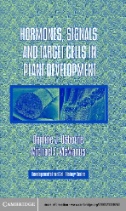 Hormones, Signals and Target Cells in Plant Development
Meristematic cells in plants become the many different types of cells found in a mature plant. This is achieved by a selective response to chemical signals both from neighbouring cells and distant tissues. It is these responses that shape the plant, its time of flowering, the sex of its flowers, its length of survival or progress to senescence and death.
Hormones, Signals and Target Cells in Plant Development
Meristematic cells in plants become the many different types of cells found in a mature plant. This is achieved by a selective response to chemical signals both from neighbouring cells and distant tissues. It is these responses that shape the plant, its time of flowering, the sex of its flowers, its length of survival or progress to senescence and death.
-
 The Importance of Species : Perspectives on Expendability and Triage
A great many species are threatened by the expanding human population. Though the public generally favors environmental protection, conservation does not come without sacrifice and cost. Many decision makers wonder if every species is worth the trouble. Of what consequence would the extinction of, say, spotted owls or snail darters be? Are some species expendable? Given the reality of limited money for conservation efforts, there is a compelling need for scientists to help conservation practitioners set priorities and identify species most in need of urgent attention.
The Importance of Species : Perspectives on Expendability and Triage
A great many species are threatened by the expanding human population. Though the public generally favors environmental protection, conservation does not come without sacrifice and cost. Many decision makers wonder if every species is worth the trouble. Of what consequence would the extinction of, say, spotted owls or snail darters be? Are some species expendable? Given the reality of limited money for conservation efforts, there is a compelling need for scientists to help conservation practitioners set priorities and identify species most in need of urgent attention.
-
 Integrative Organismal Biology
Integrative Organismal Biology synthesizes current understandings of the causes and consequences of individual variation at the physiological, behavioral and organismal levels. Emphasizing key topics such as phenotypic plasticity and flexibility, and summarizing emerging areas such as ecological immunology, oxidative stress biology and others, Integrative Organismal Biology pulls together information from diverse disciplines to provide a synthetic view of the role of the individual in evolution.
Integrative Organismal Biology
Integrative Organismal Biology synthesizes current understandings of the causes and consequences of individual variation at the physiological, behavioral and organismal levels. Emphasizing key topics such as phenotypic plasticity and flexibility, and summarizing emerging areas such as ecological immunology, oxidative stress biology and others, Integrative Organismal Biology pulls together information from diverse disciplines to provide a synthetic view of the role of the individual in evolution.
-
 Kant's Theory of Biology
During the last twenty years, Kant's theory of biology has increasingly attracted the attention of scholars and developed into a field which is growing rapidly in importance within Kant studies. The volume presents fifteen interpretative essays written by experts working in the field, covering topics from seventeenth- and eighteenth-century biological theories, the development of the philosophy of biology in Kant's writings, the theory of organisms in Kant's Critique of the Power of Judgment, and current perspectives on the teleology of nature.
Kant's Theory of Biology
During the last twenty years, Kant's theory of biology has increasingly attracted the attention of scholars and developed into a field which is growing rapidly in importance within Kant studies. The volume presents fifteen interpretative essays written by experts working in the field, covering topics from seventeenth- and eighteenth-century biological theories, the development of the philosophy of biology in Kant's writings, the theory of organisms in Kant's Critique of the Power of Judgment, and current perspectives on the teleology of nature.
-
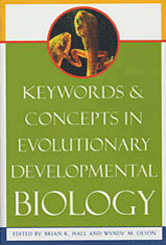 Keywords and Concepts in Evolutionary Developmental Biology
The first comprehensive reference work for this expanding field. Covering more than fifty central terms and concepts in entries written by leading experts, Keywords offers an overview of all that is embraced by this new subdiscipline of biology, providing the core insights and ideas that show how embryonic development relates to life-history evolution, adaptation, and responses to and integration with environmental factors.
Keywords and Concepts in Evolutionary Developmental Biology
The first comprehensive reference work for this expanding field. Covering more than fifty central terms and concepts in entries written by leading experts, Keywords offers an overview of all that is embraced by this new subdiscipline of biology, providing the core insights and ideas that show how embryonic development relates to life-history evolution, adaptation, and responses to and integration with environmental factors.
-
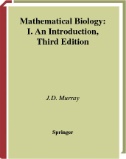 Mathematical Biology
It has been over a decade since the release of the now classic original edition of Murray's Mathematical Biology. Since then mathematical biology has grown at an astonishing rate and is well established as a distinct discipline. Mathematical modeling is now being applied in every major discipline in the biomedical sciences. Though the field has become increasingly large and specialized, this book remains important as a text that introduces some of the exciting problems that arise in biology and gives some indication of the wide spectrum of questions that modeling can address.
Mathematical Biology
It has been over a decade since the release of the now classic original edition of Murray's Mathematical Biology. Since then mathematical biology has grown at an astonishing rate and is well established as a distinct discipline. Mathematical modeling is now being applied in every major discipline in the biomedical sciences. Though the field has become increasingly large and specialized, this book remains important as a text that introduces some of the exciting problems that arise in biology and gives some indication of the wide spectrum of questions that modeling can address.
-
 Penguin Dictionary of Biology
Fully revised and updated to include the latest developments in the field, this dictionary offers clear explanations of biological concepts and processes, and the broadest coverage of the subject, from ecology to immunology and cytology.
Penguin Dictionary of Biology
Fully revised and updated to include the latest developments in the field, this dictionary offers clear explanations of biological concepts and processes, and the broadest coverage of the subject, from ecology to immunology and cytology.
-
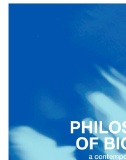 Philosophy of Biology : A Contemporary Introduction
Is life a purely physical process? What is human nature? Which of our traits is essential to us? In this volume, Daniel McShea and Alex Rosenberg – a biologist and a philosopher, respectively – join forces to create a new gateway to the philosophy of biology; making the major issues accessible and relevant to biologists and philosophers alike. Exploring concepts such as supervenience; the controversies about genocentrism and genetic determinism; and the debate about major transitions central to contemporary thinking about macroevolution; the authors lay out the broad terms in which we should assess the impact of biology on human capacities, social institutions and ethical values.
Philosophy of Biology : A Contemporary Introduction
Is life a purely physical process? What is human nature? Which of our traits is essential to us? In this volume, Daniel McShea and Alex Rosenberg – a biologist and a philosopher, respectively – join forces to create a new gateway to the philosophy of biology; making the major issues accessible and relevant to biologists and philosophers alike. Exploring concepts such as supervenience; the controversies about genocentrism and genetic determinism; and the debate about major transitions central to contemporary thinking about macroevolution; the authors lay out the broad terms in which we should assess the impact of biology on human capacities, social institutions and ethical values.
-
 Population Ecology
Ecology is capturing the popular imagination like never before, with issues such as climate change, species extinctions, and habitat destruction becoming ever more prominent. At the same time, the science of ecology has advanced dramatically, growing in mathematical and theoretical sophistication. Here, two leading experts present the fundamental quantitative principles of ecology in an accessible yet rigorous way, introducing students to the most basic of all ecological subjects, the structure and dynamics of populations.
Population Ecology
Ecology is capturing the popular imagination like never before, with issues such as climate change, species extinctions, and habitat destruction becoming ever more prominent. At the same time, the science of ecology has advanced dramatically, growing in mathematical and theoretical sophistication. Here, two leading experts present the fundamental quantitative principles of ecology in an accessible yet rigorous way, introducing students to the most basic of all ecological subjects, the structure and dynamics of populations.
-
 Primate Anatomy
This book is unlike ay other work on primates: it systematically reviews the biology of all living primates, including humans. It describes their bio-geographical information and provides crucial data pertaining to their body size, fur coloration external distinguishing features, habitat and basic life strategies. Now in its third edition, Primate Anatomy discusses species that are new to science since the last edition with details concerning anatomical features among primates that were re-discovered.
Primate Anatomy
This book is unlike ay other work on primates: it systematically reviews the biology of all living primates, including humans. It describes their bio-geographical information and provides crucial data pertaining to their body size, fur coloration external distinguishing features, habitat and basic life strategies. Now in its third edition, Primate Anatomy discusses species that are new to science since the last edition with details concerning anatomical features among primates that were re-discovered.
-
 The Princeton Guide to Evolution
The Princeton Guide to Evolution is a comprehensive, concise, and authoritative reference to the major subjects and key concepts in evolutionary biology, from genes to mass extinctions.
The Princeton Guide to Evolution
The Princeton Guide to Evolution is a comprehensive, concise, and authoritative reference to the major subjects and key concepts in evolutionary biology, from genes to mass extinctions.
-
 Principles of Ecology
Ecology considers how organisms of the same species interact with each other, how organisms of different species in the same space interact, and how multiple communities interact to make up an ecosystem, information crucial in understanding how biodiversity affects ecological function. In over 120 articles, Principles of Ecology addresses topics including: Morphology, Human ecology, Resilience, Social ecology, Co-evolution, Traits, Biome and Biosphere.
Principles of Ecology
Ecology considers how organisms of the same species interact with each other, how organisms of different species in the same space interact, and how multiple communities interact to make up an ecosystem, information crucial in understanding how biodiversity affects ecological function. In over 120 articles, Principles of Ecology addresses topics including: Morphology, Human ecology, Resilience, Social ecology, Co-evolution, Traits, Biome and Biosphere.
-
 The Runes of Evolution : How the Universe Became Self-Aware
How did human beings acquire imaginations that can conjure up untrue possibilities? How did the Universe become self-aware? In The Runes of Evolution, Simon Conway Morris revitalizes the study of evolution from the perspective of convergence, providing us with compelling new evidence to support the mounting scientific view that the history of life is far more predictable than once thought.
The Runes of Evolution : How the Universe Became Self-Aware
How did human beings acquire imaginations that can conjure up untrue possibilities? How did the Universe become self-aware? In The Runes of Evolution, Simon Conway Morris revitalizes the study of evolution from the perspective of convergence, providing us with compelling new evidence to support the mounting scientific view that the history of life is far more predictable than once thought.
-
 The Secret Body: How the New Science of the Human Body Is Changing the Way We Live
"A perfect blend of cutting-edge science and compelling storytelling."--Bill Bryson A revolutionary new vision of human biology and the scientific breakthroughs that will transform our lives Imagine knowing years in advance whether you are likely to get cancer or having a personalized understanding of your individual genes, organs, and cells. Imagine being able to monitor your body's well-being, or have a diet tailored to your microbiome. The Secret Body reveals how these and other stunning breakthroughs and technologies are transforming our understanding of how the human body works, what it is capable of, how to protect it from disease, and how we might manipulate it in the future. Taking readers to the cutting edge of research, Daniel Davis shows how radical new possibilities are becoming realities thanks to the visionary efforts of scientists who are revealing the invisible and secret universe within each of us. Focusing on six important frontiers, Davis describes what we are learning about cells, the development of the fetus, the body's immune system, the brain, the microbiome, and the genome--areas of human biology that are usually understood in isolation. Bringing them together here for the first time, Davis offers a new vision of the human body as a biological wonder of dizzying complexity and possibility. Written by an award-winning scientist at the forefront of this adventure, The Secret Body is a gripping drama of discovery and a landmark account of the dawning revolution in human health.
The Secret Body: How the New Science of the Human Body Is Changing the Way We Live
"A perfect blend of cutting-edge science and compelling storytelling."--Bill Bryson A revolutionary new vision of human biology and the scientific breakthroughs that will transform our lives Imagine knowing years in advance whether you are likely to get cancer or having a personalized understanding of your individual genes, organs, and cells. Imagine being able to monitor your body's well-being, or have a diet tailored to your microbiome. The Secret Body reveals how these and other stunning breakthroughs and technologies are transforming our understanding of how the human body works, what it is capable of, how to protect it from disease, and how we might manipulate it in the future. Taking readers to the cutting edge of research, Daniel Davis shows how radical new possibilities are becoming realities thanks to the visionary efforts of scientists who are revealing the invisible and secret universe within each of us. Focusing on six important frontiers, Davis describes what we are learning about cells, the development of the fetus, the body's immune system, the brain, the microbiome, and the genome--areas of human biology that are usually understood in isolation. Bringing them together here for the first time, Davis offers a new vision of the human body as a biological wonder of dizzying complexity and possibility. Written by an award-winning scientist at the forefront of this adventure, The Secret Body is a gripping drama of discovery and a landmark account of the dawning revolution in human health.
-
 Species Diversity and Extinction
Species diversity is an index that incorporates the number of species in an area and also their relative abundance. Since species diversity is central to a large amount of ecological theory, its accurate measurement is key to understanding community structure and dynamics. Consequently, during the course of evolution, species have always gone extinct; however, the rate of extinction has increased in recent decades by as much as one hundred fold, some owing to environmental impact, mainly due to human activities. The authors of this book present and review important data on biodiversity and species extinction.
Species Diversity and Extinction
Species diversity is an index that incorporates the number of species in an area and also their relative abundance. Since species diversity is central to a large amount of ecological theory, its accurate measurement is key to understanding community structure and dynamics. Consequently, during the course of evolution, species have always gone extinct; however, the rate of extinction has increased in recent decades by as much as one hundred fold, some owing to environmental impact, mainly due to human activities. The authors of this book present and review important data on biodiversity and species extinction.
-
 Zero to Birth: How the Human Brain Is Built
A revelatory tale of how the human brain develops, from conception to birth and beyond. By the time a baby is born, its brain is equipped with billions of intricately crafted neurons wired together through trillions of interconnections to form a compact and breathtakingly efficient supercomputer. Zero to Birth takes you on an extraordinary journey to the very edge of creation, from the moment of an egg's fertilization through each step of a human brain's development in the womb--and even a little beyond. As pioneering experimental neurobiologist W. A. Harris guides you through the process of how the brain is built, he takes up the biggest questions that scientists have asked about the developing brain, describing many of the thrilling discoveries that were foundational to our current understanding. He weaves in a remarkable evolutionary story that begins billions of years ago in the Proterozoic eon, when multicellular animals first emerged from single-cell organisms, and reveals how the growth of a fetal brain over nine months reflects the brain's evolution through the ages. Our brains have much in common with those of other animals, and Harris offers an illuminating look at how comparative animal studies have been crucial to understanding what makes a human brain human. An unforgettable chronicle of one of nature's greatest achievements, Zero to Birth describes how the brain's incredible feat of orchestrated growth ensures that every brain is unique, and how breakthroughs at the frontiers of science are helping us to decode many traits that only reveal themselves later in life.
Zero to Birth: How the Human Brain Is Built
A revelatory tale of how the human brain develops, from conception to birth and beyond. By the time a baby is born, its brain is equipped with billions of intricately crafted neurons wired together through trillions of interconnections to form a compact and breathtakingly efficient supercomputer. Zero to Birth takes you on an extraordinary journey to the very edge of creation, from the moment of an egg's fertilization through each step of a human brain's development in the womb--and even a little beyond. As pioneering experimental neurobiologist W. A. Harris guides you through the process of how the brain is built, he takes up the biggest questions that scientists have asked about the developing brain, describing many of the thrilling discoveries that were foundational to our current understanding. He weaves in a remarkable evolutionary story that begins billions of years ago in the Proterozoic eon, when multicellular animals first emerged from single-cell organisms, and reveals how the growth of a fetal brain over nine months reflects the brain's evolution through the ages. Our brains have much in common with those of other animals, and Harris offers an illuminating look at how comparative animal studies have been crucial to understanding what makes a human brain human. An unforgettable chronicle of one of nature's greatest achievements, Zero to Birth describes how the brain's incredible feat of orchestrated growth ensures that every brain is unique, and how breakthroughs at the frontiers of science are helping us to decode many traits that only reveal themselves later in life.
 Go to A-Z Databases: Books & eBooks to search for more eBooks. Must be on campus or login with your COM account for off campus access.
Go to A-Z Databases: Books & eBooks to search for more eBooks. Must be on campus or login with your COM account for off campus access. 50 Biology Ideas You Really Need to Know
From mass extinction to immunity, and from sociobiology to swarm behaviour, 50 Biology Ideas You Really Need to Know will open you eyes to the fundamental biological processes that are essential to all life on earth, beginning with innovations unique to animals - such as the development of muscles and importance of circulation - and moving through to genetics, cells, tissues and, finally, the nature of groups of organisms.
50 Biology Ideas You Really Need to Know
From mass extinction to immunity, and from sociobiology to swarm behaviour, 50 Biology Ideas You Really Need to Know will open you eyes to the fundamental biological processes that are essential to all life on earth, beginning with innovations unique to animals - such as the development of muscles and importance of circulation - and moving through to genetics, cells, tissues and, finally, the nature of groups of organisms.
 Cambridge Dictionary of Human Biology and Evolution
Packed with descriptions of terms, specimens, sites and names, covers a broad range of subjects within human biology, physical anthropology, anatomy, auxology, primatology, physiology, genetics, paleontology, and zoology.
Cambridge Dictionary of Human Biology and Evolution
Packed with descriptions of terms, specimens, sites and names, covers a broad range of subjects within human biology, physical anthropology, anatomy, auxology, primatology, physiology, genetics, paleontology, and zoology.
 Dictionary of Developmental Biology and Embryology
The Dictionary of Developmental Biology and Embryology, Second Edition is the first comprehensive reference focused on the field's terms, research, history, and people. This authoritative A-to-Z resource covers classical morphological and cytological terms along with those from modern genetics and molecular biology.
Dictionary of Developmental Biology and Embryology
The Dictionary of Developmental Biology and Embryology, Second Edition is the first comprehensive reference focused on the field's terms, research, history, and people. This authoritative A-to-Z resource covers classical morphological and cytological terms along with those from modern genetics and molecular biology.
 Encyclopedia of the Human Genome
Presenting a comprehensive and rigorously detailed overview of current research and its groundbreaking applications, this major reference work examines many peripheral topics surrounding the field such as law, ethics, medicine and public health, history, religion and industry.
Encyclopedia of the Human Genome
Presenting a comprehensive and rigorously detailed overview of current research and its groundbreaking applications, this major reference work examines many peripheral topics surrounding the field such as law, ethics, medicine and public health, history, religion and industry.
 Genetics 101
What should the average person know about science? Because science is so central to life in the 21st century, science educators and other leaders of the scientific community believe that it is essential that everyone understand the basic concepts of the most vital and far-reaching disciplines. Genetics 101 does exactly that.
Genetics 101
What should the average person know about science? Because science is so central to life in the 21st century, science educators and other leaders of the scientific community believe that it is essential that everyone understand the basic concepts of the most vital and far-reaching disciplines. Genetics 101 does exactly that.
 Keywords and Concepts in Evolutionary Developmental Biology
The first comprehensive reference work for this expanding field. Covering more than fifty central terms and concepts in entries written by leading experts, Keywords offers an overview of all that is embraced by this new subdiscipline of biology, providing the core insights and ideas that show how embryonic development relates to life-history evolution, adaptation, and responses to and integration with environmental factors.
Keywords and Concepts in Evolutionary Developmental Biology
The first comprehensive reference work for this expanding field. Covering more than fifty central terms and concepts in entries written by leading experts, Keywords offers an overview of all that is embraced by this new subdiscipline of biology, providing the core insights and ideas that show how embryonic development relates to life-history evolution, adaptation, and responses to and integration with environmental factors.
 Penguin Dictionary of Biology
Fully revised and updated to include the latest developments in the field, this dictionary offers clear explanations of biological concepts and processes, and the broadest coverage of the subject, from ecology to immunology and cytology.
Penguin Dictionary of Biology
Fully revised and updated to include the latest developments in the field, this dictionary offers clear explanations of biological concepts and processes, and the broadest coverage of the subject, from ecology to immunology and cytology.
 The Princeton Guide to Evolution
The Princeton Guide to Evolution is a comprehensive, concise, and authoritative reference to the major subjects and key concepts in evolutionary biology, from genes to mass extinctions.
The Princeton Guide to Evolution
The Princeton Guide to Evolution is a comprehensive, concise, and authoritative reference to the major subjects and key concepts in evolutionary biology, from genes to mass extinctions.
